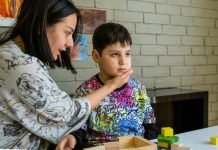
In a new study, researchers tested whether a single infusion of a unit of a child’s own or donor cord blood could improve social communication skills in children between the ages of 2-7 diagnosed with an autism spectrum disorder.
Of the 180 children in the study, the subgroup of children without an intellectual disability showed improvements in language communication, ability to sustain attention measured via eye-tracking, and increased alpha and beta EEG power, a measure of brain function.
However, those who also had an intellectual disability did not show social communication function improvement after the infusion.
The research was conducted by Duke scientists.
Approximately 40% of children with autism also have an intellectual disability, as defined as an IQ below 70.
Cord blood contains immune-modulating cells called monocytes. In the laboratory, these cells calm down a type of brain inflammation that can be seen in children with autism.
In this study, the team tested whether cord blood infusions would lessen symptoms in children with autism.
They say that more research is needed to determine why the findings in this study are different between those with and without an intellectual disability, and whether the treatment could be altered to be beneficial to more children.
It is unclear whether the failure for children with an intellectual disability is due to the short duration of the study, the outcome measures not being sensitive enough to detect a change in this population or that the cord blood is actually not an effective treatment for children with autism who also have an intellectual disability.
In the future, the team hopes to conduct a trial designed for children with autism who have intellectual disabilities focusing on outcome measures that can be targeted to test this group of children.
They also used lessons learned from this study to design an ongoing study testing other cell therapies in older children with autism without intellectual disability.
One author of the study is Joanne Kurtzberg, M.D., Jerome S. Harris Distinguished Professor of Pediatrics.
The study is published in The Journal of Pediatrics.
Copyright © 2020 Knowridge Science Report. All rights reserved.



